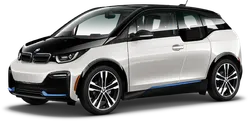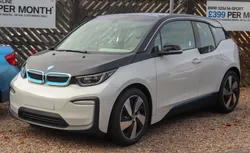

BMW i3 Generation 1 I01 Overview
Discover the BMW i3 generation 1 I01, a remarkable electric car. Explore its features and benefits, specifically in Portugal, for an eco-friendly driving experience.
The BMW i3 Generation 1, denoted as the I01, is a remarkable vehicle that has redefined the perception of electric cars since its introduction. Unveiled in 2011 and hitting the market in 2013, the i3 stood out not only...
Technical Specifications
Select Version
Dimensions
Engine
Driving
Others
History and Features
Mycarro AI
Apr 26, 2025
The BMW i3 Generation 1, denoted as the I01, is a remarkable vehicle that has redefined the perception of electric cars since its introduction. Unveiled in 2011 and hitting the market in 2013, the i3 stood out not only for its innovative use of sustainable materials but also for its unique design and focus on urban mobility. BMW aimed to create a compact electric vehicle that would resonate with environmentally conscious consumers while providing a premium driving experience.
Design and Build Quality
The design of the BMW i3 is one of its standout features. It boasts a bold, futuristic exterior that sets it apart from traditional gasoline-powered cars. The car's dimensions are compact, with an overall length of about 157 inches, allowing it to maneuver effortlessly through crowded city streets. The use of lightweight materials, primarily carbon fiber reinforced plastic (CFRP) for the body and aluminum for the chassis, not only enhances performance but also adheres to BMW's ethos of sustainability.
The interior of the i3 is just as impressive, with a minimalist design that emphasizes functionality and space. The cabin offers a truly unique blend of recycled and renewable materials, including natural fibers and sustainably sourced wood accents. The spacious interior provides room for four passengers and features an intuitive layout, outfitted with state-of-the-art technology. This approach reinforces BMW's commitment to eco-friendliness without compromising luxury.
Performance and Drivetrain
Under the hood, the i3 is equipped with an electric motor that delivers an output of 170 horsepower and 184 lb-ft of torque, providing a captivating performance for an electric vehicle. The rear-wheel-drive layout allows for enhanced handling and driving dynamics. The i3 is capable of accelerating from 0 to 60 mph in approximately 7.2 seconds, making it a sprightly urban partner.
The car originally came with a 22 kWh battery pack, providing an estimated range of about 90 miles on a full charge. However, a 33 kWh battery option was introduced later in the model's lifecycle, extending the range to approximately 114 miles. BMW also offered an optional range extender, a small gasoline engine designed to charge the battery on the go, enhancing versatility for longer journeys.
Technology and Features
The BMW i3 is packed with cutting-edge technology and features specifically designed for a modern driving experience. The iDrive infotainment system, featuring a high-resolution display and intuitive controls, allows drivers to easily access navigation, multimedia, and vehicle settings. Additionally, connectivity features such as Bluetooth and smartphone integration via Apple CarPlay and Android Auto provide a seamless experience for users.
Safety was a key consideration in the i3's design, with extensive active and passive safety features, including multiple airbags, stability control, lane departure warning, and collision avoidance systems. The car's structure, reinforced by its carbon fiber construction, also contributes to its overall safety rating.
Market Impact and Reception
Upon its release, the BMW i3 received widespread acclaim for its innovative approach and design. It became a standout model in the electric vehicle market, earning multiple awards, including the prestigious World Car Design of the Year in 2014. The i3 appealed to a diverse customer base, ranging from eco-conscious buyers to urban dwellers seeking an agile and stylish vehicle.
However, despite its accolades, the i3 faced intense competition in the ever-evolving EV market. Skepticism about the range of electric vehicles and the availability of charging infrastructure posed challenges. Nonetheless, the i3 carved out a niche for itself, particularly in urban environments where its compact size and zero emissions aligned perfectly with the growing demand for sustainable transportation.
Legacy and Conclusion
The BMW i3 Generation 1 (I01) represents a pioneering effort in electric mobility, showcasing BMW's commitment to innovation and sustainability. Its unique design, practical range, and premium features set a benchmark for future electric vehicles. Although production of the i3 ceased in 2021, its legacy continues to influence the automotive industry, inspiring other manufacturers to pursue electric mobility with the same fervor. The i3 stands as a testament to BMW's forward-thinking vision, and it remains a symbolic vehicle in the transition towards a more sustainable automotive landscape.
